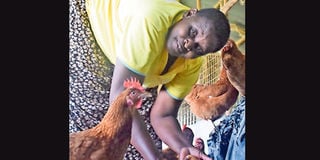Her brood lays cash despite influx of eggs from Uganda

Elizabeth Jakinda collects eggs at her poultry farm in Kisumu. She says her biggest problem is competition from cheaper eggs being imported from Uganda. PHOTO | ELIZABETH OJINA | NMG
What you need to know:
- Her passion for keep birds was ignited by her friend. She bought 100 two-month-old Kenbreed chicks at sh250 each for a start.
- Almost 15 years down the line, Jakinda says she has no regrets. Over time, the birds grew old and she decided to replace them with younger ones. Moved by the desire to expand her business, Jakinda bought 300 chicks.
- Jakinda Poultry Farm gets at least 20 trays of eggs daily. The farmer sells a tray at Sh280. Being a poultry farmer also comes with challenges.
- Dr Denis Mujibi, a researcher and chief executive of Usomi Agriculture Ltd, says inefficiency in production contributes to competitiveness problems.
The kilometre-long road from Uyoma Naya hardware leads the Seeds of Gold team to Jakinda Poultry Farm in Nyamasaria, Kisumu County.
We meet Elizabeth Jakinda at the farm. She is in a yellow blouse and floral brown skirt attending to her 800 layers. She refills the containers with water and commercial feeds.
“I fill the cans with feeds that can last the whole day. The layers consume about one and half bags of 50 kilogramme feeds daily,” Jakinda says.
Next, she goes to the laying boxes where she collects the eggs and puts them in trays. The mother of six has been involved in poultry farming since 2004.
Her passion for keep birds was ignited by her friend. She bought 100 two-month-old Kenbreed chicks at sh250 each for a start.
“They had been vaccinated against several diseases and their survival chances were high compared to one-day-old chicks. I placed them in a temporary coop before finally setting up this structure,” she says.
The farmer had saved around Sh30,000 from her water vending and other businesses to build the eight metre by four metre iron sheet structure. She also bought two 70kg bags of commercial feeds.
“Back then, chicken feeds were a bit affordable. A 70kg bag went for Sh1,000. These days, a 50kg bag is sold for Sh2,350,” she adds.
Three months later, her birds were mature enough to begin laying eggs. She would collect three trays of eggs daily and sell one for Sh300.
EXPAND HER AGRIBUSINESS
Almost 15 years down the line, Jakinda says she has no regrets. Over time, the birds grew old and she decided to replace them with younger ones. Moved by the desire to expand her business, Jakinda bought 300 chicks.
“Often, I would replace the old generation with younger ones. I made sure I had birds that were at different stages of laying eggs to keep up with the market demand,” she says.
For now, about 500 birds are laying eggs, some 180 are towards the stage of being disposed off while the rest are pullets.
The hens are given collard (sukuma wiki) and plenty of clean water to drink. The 800 layers consume at least 52 bags of 50kg feeds every month.
Jakinda Poultry Farm gets at least 20 trays of eggs daily. The farmer sells a tray at Sh280. Being a poultry farmer also comes with challenges.
Jakinda says her biggest problem is competition from cheap eggs being imported from Uganda. Others are financial constraints and diseases.
“Our market is flooded with Ugandan eggs. Traders prefer the eggs from Uganda because a tray can go for as low as Sh220,” she says.
“Vaccines also cost a lot. Diseases such as New Castle Disease can wipe out a farmer’s flock.”
Dr Denis Mujibi, a researcher and chief executive of Usomi Agriculture Ltd, says inefficiency in production contributes to competitiveness problems.
“We don’t produce enough raw materials to make poultry feed. Instead of competing in egg production, we should look towards egg processing. Our expensive eggs can be turned into powder. This can be used for industrial purposes as relief food or other purposes,” he says.




